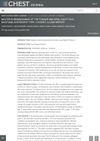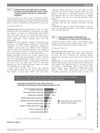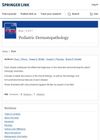Search
for
Sort by
Research
120-150 / 1000+ results
research Multiple Hemangiomas of the Tongue and Oral Cavity in a Myotonic Dystrophy Type 1 Patient: A Case Report
A patient with Myotonic dystrophy type 1 had multiple tongue hemangiomas and was sensitive to anesthesia.

research Utilization of Nanotechnology and Experimental Design in Development and Optimization of Aloe Vera Gel Loaded with Finasteride-Garlic Oil-Nanotransfersomes
A gel made with finasteride, garlic oil, and Aloe vera using nanotechnology can potentially treat hair loss more effectively.

research Symptom Impact and Unmet Need in Systemic/Cutaneous Lupus Erythematosus: Results from a Patient-Centered Study Set in a Social Media Community
SLE significantly affects daily life, especially through fatigue and joint pain, highlighting the need for better treatments.

research Evaluation of the Efficacy of Transdermal Drug Delivery of Calcipotriol Plus Betamethasone Versus Tacrolimus in the Treatment of Vitiligo
Calcipotriol plus betamethasone with microneedling works better than tacrolimus for treating vitiligo.

research Mind the Gap: Sex Bias in Basic Skin Research
The document concludes that there is a significant lack of reporting on the sex and age of cells in skin research, which could affect clinical trials and treatments.
research Herbs for Benign Prostatic Hyperplasia
Herbal treatments can help with early-stage BPH symptoms, but more research is needed.
research The Pubertal Presentation of Polycystic Ovary Syndrome (PCOS)
Girls with PCOS often start puberty earlier and have signs of insulin resistance from a young age.
research A New Look at an Old Option in the Treatment of Early-Stage Prostate Cancer: Hormone Therapy as an Alternative to Watchful Waiting
Hormone therapy might be a proactive alternative to watchful waiting for early-stage prostate cancer, potentially improving survival without aggressive treatment downsides.

research Noncoding dsRNA Induces Retinoic Acid Synthesis to Stimulate Hair Follicle Regeneration via TLR3
Noncoding dsRNA boosts hair growth by activating TLR3 and increasing retinoic acid.
research Photo-Assisted Epilation: Review and Personal Observations
Laser hair removal is a promising method for long-term or permanent hair removal.
research Effect of a Six-Month Treatment Regimen of Metformin on 17-Hydroxyprogesterone Responses to GnRH Agonist in Polycystic Ovary Syndrome
Metformin can start ovulation and may lower 17P response in PCOS, but six months is too short to improve hair growth or change body fat distribution.
research Preparation and Optimization of Aloe Ferox Gel Loaded with Finasteride-Oregano Oil Nanocubosomes for Treatment of Alopecia
The aloe ferox gel with finasteride and oregano oil may effectively treat alopecia.
research National Institutes of Health Dermatology Funding Trends 2015–2019
NIH dermatology funding increased by 14.7% from 2015 to 2019, but men and certain states and institutions received most of the money.

research Chemotherapy-Induced Alopecia
Chemotherapy often causes temporary hair loss, which is distressing and needs better treatment and support.

research Androgenetic Alopecia: Identification Of Four Genetic Risk Loci And Evidence For The Contribution Of WNT Signaling To Its Etiology
Four genetic risk spots found for hair loss, with WNT signaling involved and a link to curly hair.

research Epidermal Retinol Dehydrogenases Cyclically Regulate Stem Cell Markers and Clock Genes and Influence Hair Composition
Enzymes involved in Vitamin A metabolism affect hair growth and type in mice.

research DNA Dioxygenases Tet2/3 Regulate Gene Promoter Accessibility and Three-Dimensional Chromatin Topology in Lineage-Specific Loci to Control Hair Growth
Tet2 and Tet3 enzymes are essential for controlling hair growth by affecting DNA demethylation and gene expression in mice.

research Spironolactone in Hidradenitis Suppurativa: A Single-Center Study
Spironolactone may help women with hidradenitis suppurativa.

research A Systematic Simulation-Based Meta-Analytical Framework for Prediction of Physiological Biomarkers in Alopecia
The study identified 12 potential biomarkers for hair loss and how they affect hair growth.

research Dietary Vitamin A Impacts Refractory Telogen
Eating too much or too little vitamin A can cause hair loss.
research Mitigation of Epidermal Growth Factor Receptor Inhibitor-Induced Side Effects Utilizing Melanin and Vascular-Specific Lasers: A Case Report Series
Lasers can help reduce skin side effects from cancer treatment.

research Rates of Polycystic Ovary Syndrome Symptoms in Relatives of Patients With PCOS
Female relatives of PCOS patients have a higher chance of showing PCOS symptoms.

research Characterization of Transport Systems for Cysteine, Lysine, Alanine, and Leucine in Wool Follicles of Sheep
Sheep wool follicles absorb different amino acids at various rates and locations, which could affect wool growth based on diet and genetics.

research Sebaceous Immunobiology: Skin Homeostasis, Innate Immunity Coordination, Inflammatory Response, and Disease Associations
Sebaceous glands play a key role in skin health, immunity, and various skin diseases.

research Dynamic Morphogen-p63 Chromatin Interactions That Guide Epigenetic Changes and p63 Activity in Surface Ectoderm Commitment
The study found that p63 needs signals from morphogens to help skin cells differentiate properly.

research DNA Dioxygenases Tet2/3 Regulate Gene Promoter Accessibility and Chromatin Topology in Lineage-Specific Loci to Control Epithelial Differentiation
The enzymes Tet2 and Tet3 are important for skin cell development and hair growth.
research Pharmacokinetics of Modified Slow-Release Oral Testosterone Over 10 Days in Normal Men with Experimental Hypogonadism
The oral testosterone effectively increased testosterone levels and reduced SHBG, showing promise for treating testosterone deficiency.

research Pediatric Dermatopathology
The book is a detailed guide on children's skin disorders, their causes, and diagnosis, with many images for medical professionals.

research Pseudofolliculitis Barbae: Overview and Treatment Modalities
The document concludes that various treatments, including laser therapy, are effective for managing pseudofolliculitis barbae, especially in darker skin types.